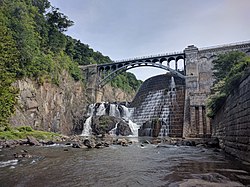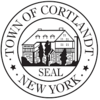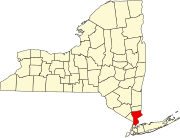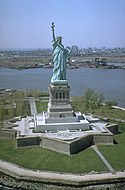Cortlandt, New York
Cortlandt, New York | |
|---|---|
| Town of Cortlandt | |
 Croton Gorge waterfall | |
 Location of Cortlandt, New York | |
| Coordinates: 41°15′41″N 73°54′9″W / 41.26139°N 73.90250°W | |
| Country | United States |
| State | New York |
| County | Westchester |
| Founded | 1788[1] |
| Government | |
| • Type | Manager-Council |
| • Town Supervisor | Richard H. Becker (D)[2] |
| • Town Board | Members |
| Area | |
• Total | 50.02 sq mi (129.54 km2) |
| • Land | 39.26 sq mi (101.68 km2) |
| • Water | 10.76 sq mi (27.86 km2) |
| Elevation | 318 ft (97 m) |
| Population | |
• Total | 42,545 |
| • Density | 850/sq mi (330/km2) |
| Time zone | UTC-5 (Eastern (EST)) |
| • Summer (DST) | UTC-4 (EDT) |
| FIPS code | 36-18410 |
| GNIS feature ID | 0978871 |
| Website | townofcortlandt |
Cortlandt is a town in Westchester County, New York, United States, located at the northwestern edge of the county, at the eastern terminus of the Bear Mountain Bridge. As of the 2020 census, the population was 42,545. The town includes the villages of Buchanan and Croton-on-Hudson.
History
[edit]The Bear Mountain Bridge Road and Toll House and the Old Croton Dam are listed on the National Register of Historic Places.[7]
Cortlandt is also known for its Revolutionary War history, specifically the location of the strategic Kings Ferry between Stony Point and Verplanck's Point, which George Washington's army used to cross the Hudson on its march to Yorktown, Virginia, in 1781. John Trumbull's full-length oil portrait of Washington at Verplanck's Point exists in two versions.
Geography
[edit]The town's western borders are the Hudson River and the city of Peekskill. Its northern borders are the towns of Philipstown and Putnam Valley in Putnam County. Its eastern border is the town of Yorktown. Its southern borders are the towns of New Castle and Ossining.
According to the United States Census Bureau, the town has a total area of 50.0 square miles (129.5 km2), of which 39.3 square miles (101.7 km2) is land and 10.8 square miles (27.9 km2), or 21.51%, is water.[8]
Demographics
[edit]| Census | Pop. | Note | %± |
|---|---|---|---|
| 1790 | 1,932 | — | |
| 1820 | 3,421 | — | |
| 1830 | 3,840 | 12.2% | |
| 1840 | 5,592 | 45.6% | |
| 1850 | 7,758 | 38.7% | |
| 1860 | 10,074 | 29.9% | |
| 1870 | 11,694 | 16.1% | |
| 1880 | 12,664 | 8.3% | |
| 1890 | 15,139 | 19.5% | |
| 1900 | 18,703 | 23.5% | |
| 1910 | 22,255 | 19.0% | |
| 1920 | 21,023 | −5.5% | |
| 1930 | 26,492 | 26.0% | |
| 1940 | 11,016 | −58.4% | |
| 1950 | 14,146 | 28.4% | |
| 1960 | 26,336 | 86.2% | |
| 1970 | 34,393 | 30.6% | |
| 1980 | 35,705 | 3.8% | |
| 1990 | 37,357 | 4.6% | |
| 2000 | 38,467 | 3.0% | |
| 2010 | 41,592 | 8.1% | |
| 2020 | 42,545 | 2.3% | |
| U.S. Decennial Census[9][5] | |||
At the 2000 census there were 38,467 people in 13,517 households, including 10,137 families, in the town. The population density was 969.7 inhabitants per square mile (374.4/km2). There were 14,065 housing units at an average density of 354.5 units per square mile (136.9 units/km2). The racial makeup of the town was 88.60% White, 4.59% African American, 0.21% Native American, 2.57% Asian, 0.01% Pacific Islander, 2.35% from other races, and 1.68% from two or more races. Hispanic or Latino of any race were 7.19%.[10]
Of the 13,517 households 39.3% had children under the age of 18 living with them, 64.3% were married couples living together, 7.9% had a female householder with no husband present, and 25.0% were non-families. 21.3% of households were one person and 8.8% were one person aged 65 or older. The average household size was 2.75 and the average family size was 3.22.
The age distribution was 26.5% under the age of 18, 5.3% from 18 to 24, 30.1% from 25 to 44, 25.3% from 45 to 64, and 12.8% 65 or older. The median age was 39 years. For every 100 females, there were 95.8 males. For every 100 females age 18 and over, there were 92.7 males.
The median household income was $75,442 and the median family income was $89,053. Males had a median income of $59,949 versus $41,115 for females. The per capita income for the town was $33,432. About 2.9% of families and 4.5% of the population were below the poverty line, including 4.1% of those under age 18 and 5.1% of those age 65 or over.
Transportation
[edit]Commuter service to New York City is available via the Cortlandt train station and the Croton-Harmon train station, served by Metro-North Railroad. Croton-Harmon is also served by Amtrak.
U.S. Route 9 passes through the town along the Hudson River side.
The Appalachian Trail (AT) runs through a very small portion of the north west portion of the town near and over the Bear Mountain Bridge, which is the only section of the AT in Westchester County NY.
Government
[edit]Cortlandt is governed by a town board and the Town Supervisor is Dr. Richard Becker, who replaced Linda Puglisi as the longest-serving Town Supervisor in the 200+-year history of the town (30 years). The mayors of Buchanan and Croton are Theresa Knickerbocker and Brian Pugh, respectively. Law enforcement services in Cortlandt are provided by the New York State Police and the Westchester County Department of Public Safety. The villages of Buchanan and Croton-on-Hudson also have their own, independent police departments.
Communities and locations in Cortlandt
[edit]- Buchanan – the village of Buchanan
- Cortlandt Manor – a hamlet in the Town of Cortlandt
- Crompond – A hamlet partially in the Town of Cortlandt
- Croton-on-Hudson – the village of Croton-on-Hudson
- Crugers – a hamlet of Cortlandt.
- Furnace Woods
- Montrose – a hamlet of Cortlandt. Includes Cortlandt station.
- Mount Airy – a neighborhood
- Oscawana – includes Oscawana Island
- Pleasantside
- Roe Park
- Toddville
- Valeria
- Van Cortlandtville – The John Jones Homestead, Old St. Peter's Church, and Van Cortlandtville School are listed on the National Register of Historic Places.[7]
- Verplanck – a hamlet of Cortlandt
- Woodybrook
References
[edit]- ^ "Town Profile - Town of Cortlandt, NY". Archived from the original on May 11, 2016. Retrieved May 31, 2016.
- ^ "Town Supervisor - Town of Cortlandt, NY".
- ^ "Town Board - Town of Cortlandt, NY".
- ^ "2016 U.S. Gazetteer Files". United States Census Bureau. Retrieved July 5, 2017.
- ^ a b US Census Bureau, 2020 Census Results, Cortlandt town, Westchester County, New York QuickFacts https://www.census.gov/quickfacts/cortlandttownwestchestercountynewyork
- ^ a b "Population and Housing Unit Estimates". Retrieved June 9, 2017.
- ^ a b "National Register Information System". National Register of Historic Places. National Park Service. March 13, 2009.
- ^ "Geographic Identifiers: 2010 Demographic Profile Data (G001): Cortlandt town, Westchester County, New York". U.S. Census Bureau, American Factfinder. Archived from the original on February 12, 2020. Retrieved January 29, 2013.
- ^ "Census of Population and Housing". Census.gov. Retrieved June 4, 2015.
- ^ "U.S. Census website". United States Census Bureau. Retrieved January 31, 2008.



